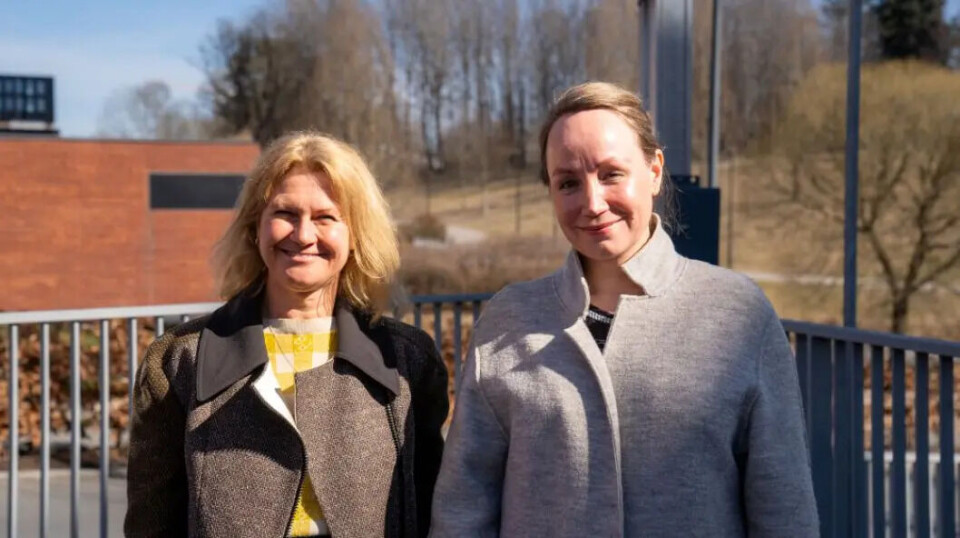THIS CONTENT IS BROUGHT TO YOU BY University of Oslo - read more
There's no one correct way to react when war and conflict draw closer
How does a world of war and conflict affect you and me?

The current situation in Ukraine and the Middle East, along with a more unpredictable president in the US, has made many in Norway feel that war and conflict have moved closer to home.
“We're experiencing a very confusing and unstable situation in the world today, where things you thought would not happen suddenly do – like Trump wanting to buy Greenland,” says Sigrun Marie Moss.
She is a professor at the University of Oslo's Department of Psychology and a specialist in political psychology.
Moss describes the state of the world as evoking a feeling that ‘we have thrown a lot of cards up in the air that were previously neatly placed in the deck.’
“It's an unstable, unpredictable time," she says.
“I go back and forth between experiencing the time we live in as frightening and thinking that 'it'll probably be alright.' Which extreme I choose depends somewhat on how I’m feeling that day,” says Gunn Enli.
She is a professor at the University of Oslo's Department of Media and Communication and a specialist in politics and social media.
“The most frightening aspect is that the thought of war has crept closer, both in our own country and in our neighbouring regions,” says Enli.
It’s nice to feel like you're helping
Both professors believe that many people feel the need to shield themselves from the state of the world. At the same time, it’s necessary to stay informed and engaged. It’s not an either/or situation.
Both strategies are encouraged by psychology, according to Moss.
“Taking some sort of action when you're experiencing uncertainty and hopelessness helps you feel like you're contributing, like you're taking some control and reclaiming a bit of agency,” she says.
Moss emphasises that it's also important to be able to disengage and take breaks from war and conflict.
“You don’t need to be plugged in and reading things all the time,” she says.
Gunn Enli agrees, but sees that there are many ways to cope with today’s world.
“As media researchers, we're seeing an increasing number of young people who are so-called news deniers. They choose not to watch, listen to, or read the news. For a long time, we were concerned about news avoiders because they weren't connecting with democracy. But now we also see that this – at least in small doses – can have its merits. It's healthy to be able to disconnect and take media breaks,” she says.
Shouldn't go overboard
Enli points to doomscrolling as the opposite. Instead of avoiding the news, you becomes obsessed, going deeper and deeper without being able to log off.
“There are many who work actively to limit their scrolling or self-regulate to avoid being sucked into a black hole,” says Enli.
“Personally, I find it scarier to only read headlines than to delve deeper into the material. I try to be a bit cautious about where I read news, and prefer to listen to podcasts that explore the topics more deeply,” says Sigrun Marie Moss.
Enli says that her strategy is actually to research it and be analytical about it. One of her research fields in recent years has been Trump's media strategies and how populists use the media.
“In that way, my work has actually helped me maintain an analytical distance from what's happening. Amid all of it, it's rewarding to see that my field is super relevant for understanding the times we're living in,” she says.
Enli emphasises that we live in an attention economy where Trump and his campaign have, in a way, won.
“Trump and his administration are media-focused in everything they do. He knows what creates headlines and how to keep himself in the media spotlight. A crucial part of his strategy is to always be present in the news cycle,” Enli points out.
Sigrun Marie Moss finds Trump as a leader interesting from a psychological perspective:
“The US has entered a culture war with strong polarisation. Different groups interpret things very differently. The groups' narratives about the political landscape are in stark contrast to one another," she says.
Moss refers to new research that shows that 90 per cent of Republicans support what Trump is doing now, while only 4 per cent of Democrats do.
“That's a divide we haven't seen before. It's concerning,” she says.
Armchair activism
Social media has become an important arena for showing engagement, but is clicking ‘like’ or posting pictures of Ukrainian fields or sharing images from bombed-out Gaza really helping anyone?
“This is often referred to as armchair activism. It tends to be looked down upon when people just click ‘like’ and don’t do anything more. They don’t engage, they don’t join demonstrations, they don’t donate money, they don’t join a political party – they just click ‘like’ or change their profile picture from the safety of an armchair,” says Gunn Enli.
However, she notes that many of us do both:
“Those who are perhaps most active on social media and use it for activism are often also activists who participate in demonstrations. They live and breathe this.”
She stresses that even just ‘liking’ something is a form of expression and a contribution.
“There's also a sense of community on social media. You contribute to others. You can create networks and you can help motivate action,” she says.
Sigrun Marie Moss agrees:
“Speaking out on social media is about expressing that a person belongs to a community of shared values: ‘Against Israel's actions in Palestine,’ or ‘Against Trump buying Greenland,’ or ‘Against the war in Ukraine.’ When many people express the same view, it can help open doors to a belief in collective activism and further action.”
Easier to create a 'we' based on fear and distance from others
“Can war and conflict bring out both the best and the worst in us, even for those of us who are somewhat distanced from it?”
“Psychology shows that we respond very positively to becoming a 'we.' There was a lot of talk about that after July 22, for example, and grandparents who lived through World War II spoke warmly about the feeling of community, despite being in a very difficult situation,” says the psychology professor.
She is, however, concerned about a polarising 'we' that seems to be growing stronger.
“In psychological research, we see that leaders who try to work with identities are more effective when they work with hate and differences than when they try to promote solidarity. Unfortunately, it's easier to create a 'we' based on fear and distance from others than to create a large, shared 'we',” says Moss.
“What do you both hope for the future, say five years from now?”
“I hope that we can take the time we’re living through, with war and conflict near us, as a turning point and a defining moment to actually come together and create new rules. I hope that the world can truly become a fairer place for more of us in the long run,” says Sigrun Marie Moss.
“I hope that those who are young today don't go down the worst possible path of polarisation, division of community, and conspiracy theories. I hope we land on our feet and find something in common that's worth believing in,” says Gunn Enli.
This article is based on a podcast episode featuring Professor Sigrun Marie Moss and Professor Gunn Enli. Listen to the Norwegian episode below:

This content is paid for and presented by the University of Oslo
This content is created by the University of Oslo's communication staff, who use this platform to communicate science and share results from research with the public. The University of Oslo is one of more than 80 owners of ScienceNorway.no. Read more here.
More content from the University of Oslo:
-
Where humans outshine AI: “There's something hopeful in these findings”
-
Why we need a national space weather forecast
-
Mainland Europe’s largest glacier may be halved by 2100
-
AI makes fake news more credible
-
What do our brains learn from surprises?
-
"A photograph is not automatically either true or false. It's a rhetorical device"




































